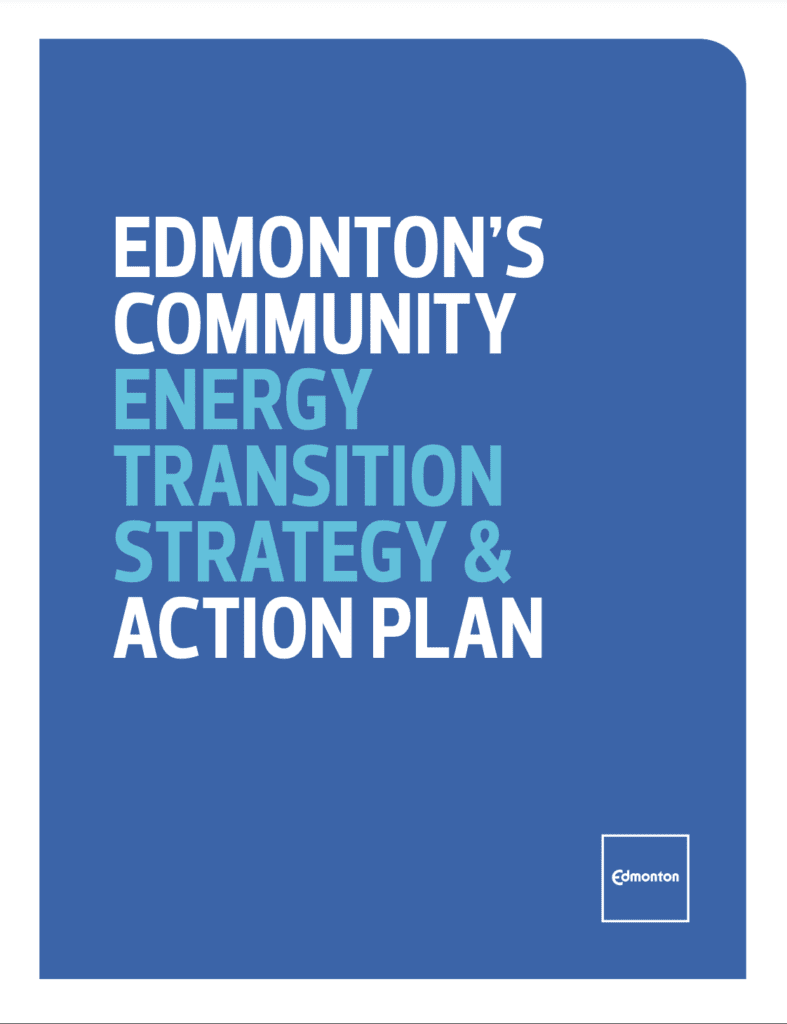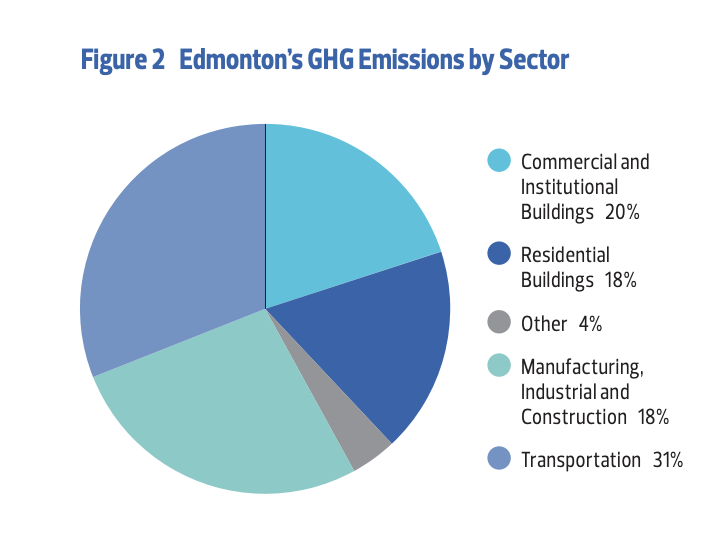Our jobs plan for combating climate change
Life for Edmontonians living in a low-carbon city will look like this:
You’ll wake up in your home, and all of your electricity that powers your appliances, lights, your heating, or the majority of it, would come from clean-energy sources. Like geothermal, solar, hydrogen and other sustainable energy sources. And you wouldn’t need the same amount of energy your home currently consumes because it would have been retrofitted or purpose-built to be energy efficient and emissions neutral.
Then when you make your way to work or school or a night out, you can walk to more amenities in your 15-minute district, or use more reliable and efficient transit, or take a cab or a car share or your ride fueled by electricity or hydrogen. More jobs and services will be located in your neighbourhood because of the City’s Plan of neighbourhood nodes or “15-minute” communities, and getting between activity nodes on transit will be faster thanks to more LRT plus untangled bus routes running neatly on corridors joining those activity nodes across the city together.
There is a chance you might be working in one of Edmonton’s expanding innovative climate-friendly energy companies: delivering energy efficiency buildings, or working at the big hydrogen plant, or cleaning up orphan wells and converting them to geothermal power plants, or using AI to reduce emissions in logistics or the food business or some other part of the green economy.
What I just described is not a fantasy, but a real and near possibility if Edmonton passes the Energy Transition Strategy at City Council on April 19, 2021.

The Energy Transition Strategy is the City’s plan to achieve the low-carbon future I just described. The Strategy ensures the City is aligned with the international standard of limiting global heating to 1.5 C while transforming our community and economy.
We have a proud heritage as energy problem solvers here in Alberta — so it’s not a big pivot to embrace the economic opportunities arising from a robust climate response. But proudly pivoting now can secure our economic place in a changing world that I firmly believe will be driven by an era of low carbon growth.
Edmontonians want action on climate change
In 2019, City Council voted to declare a climate emergency in Edmonton. We did this because addressing human-caused climate change is a mandate City Council was given by Edmontonians, and time is of the essence. Voices of denial are less and less relevant, and now the greater challenge is the voices of delay.
For many years, our surveys have indicated that Edmontonians overwhelmingly want action taken to protect our communities from climate change. Most recent data shows 75 per cent of Edmontonians believe the science and agree that we need to take “action now”.
Edmonton is already one of the fastest-warming regions in the world and science shows that our climate is expected to change even more significantly into the future. Experts have forecast that our risk of urban flooding may double, we’ll experience more frequent and intense extreme weather events and our ecosystem will change. We don’t have to look much further than the disastrous Calgary floods of the past few years, the Fort McMurray wildfires that saw Northern Albertans take refuge at the EXPO Centre, the increasingly intense summer storms we face, or the potholes caused by Edmonton’s more frequent freeze and thaw cycles.
If we continue down this path, climate change will continue to cause frequent and intense weather events that wreak havoc on communities, impact food production, threaten freshwater sources, disrupt the economy and our quality of life. All that is far more expensive and risky than mitigating those risks by living within our atmospheric carbon means and balancing our carbon budget.
Like it or not, the problem is at our doorstep today, and Edmonton City Council has done more than any other major Canadian city to prepare for the inevitability of more severe weather, earning a B+ on our climate resiliency report card (the highest mark in Canada, but recognizing there is more work to do).
This is why my council colleagues and I do not have the luxury of putting off the inevitable reckoning of climate change, because local government and the infrastructure and services we manage are at the front lines of this real risk.
The Energy Transition Strategy
The Energy Transition plan is a jobs, public health and quality of life plan, as much as it is a climate response.
All this builds on our proud heritage as energy problem solvers here in the heart of Canada’s traditional energy economy, to remain prosperous through the transition to a low-carbon economy.
This strategy contains 105 actions with various impact levels and funding requirements. The targets outlined in the strategy are the City’s boldest to date. If this strategy is adopted, it would be the first time the City of Edmonton has targets aligned with the Paris Agreement.
Under the strategy, the City will work with government partners to achieve a complete build-out of a city-wide decarbonized district energy network, expand our Light Rail Transit system and electrify our buses so we can provide more low-carbon and convenient transit options for Edmontonians. Crucially, we will enable and encourage the development and retrofit of buildings to an emissions-neutral standard.
Within the strategy, there are four “pathways” that are identified as areas of transformative action. These pathways are identified as:
- Investing and supporting a move towards a Renewable and Resilient Energy Transition
- Encourage (through policies/regulations) Emission Neutral Buildings that are highly energy-efficient, powered by renewable energy, and create a thriving energy efficiency industry
- Building out a Low Carbon City and Transportation options for Edmontonians
- Carbon Capture and Nature-Based Solutions
These measures are focused on reducing Edmonton’s emissions which come mainly from Transportation (31%), Industry (27%) and Buildings (38%).

The City’s Carbon Budget
One standout feature of the plan is a carbon accounting system for budgeting decisions and priorities: a carbon budget. This carbon budget is a crucial accounting tool as it is how the City will measure the success of our plan and how we will hold ourselves accountable for it.
For those unfamiliar with a carbon budget, it functions much like a financial budget in our household does, except instead of budgeting money, we’re budgeting carbon or greenhouse gases. Specifically the amount of greenhouse gases that can be emitted (“spent”) before we start to see the devastating effects of climate change. And this is a budget we need to balance.
Edmonton’s carbon budget is 135 megatonnes between 2020 and 2050. Living within this carbon budget would ensure we align with the Paris Accord and with the Edmonton Declaration. If we don’t meet this carbon budget we won’t be living within our “carbon” means — outspending our ecological future while letting ourselves, Canada and the world down.
I am proud to note that Edmonton is already a leader in greenhouse gas accounting, being one of only a few cities in the world that inventories all our emissions annually and accounts for both its production emissions and carbon sinks.
Adopting a carbon budget target, as Council committed to in our recent City Plan, and incorporating emissions factors into planning and priorities decision-making will ensure Edmonton continues to lead in this area. Incorporating carbon accounting in our existing financial processes such as the 10-year capital infrastructure investment outlook and priority-based operating budgeting will be a critical next step to seamlessly integrate carbon accounting with the City’s financial processes starting in the 2023-26 budget.
Carbon budgeting and accounting at a municipal level are bleeding edge work, and we will continue to learn and refine as we implement the framework, but we need to make a smart transition, conserve within our financial, carbon and ecological constraints, and come out ahead after COVID.
The Edmonton Region MUST be united in addressing climate change
Like COVID-19, climate change is not an issue that can be contained to a border or city limit. To address it effectively, we require alignment among all levels of government and across regions.
This complex metropolitan context led me to bring a motion to the April 8, 2021 Edmonton Regional Board meeting (EMRB) that asks the board administration to look for ways in which the region can coordinate standards for climate development and building energy efficiency and also explore the possibility of a carbon budget with EMRB members.
There are ethical pathways, nor any durable competitive advantage to not addressing climate change. Instead, if we act together as a region we’ll better ensure our economic success during the transition to a low carbon future. Scaling this work to the regional scale is a signal Edmonton Metro can send to the global marketplace, both to investors and talent, that our region is serious about ESG (Environmental, Social and Governance commitment), and ready to capitalize on the economic opportunities that come with doing the right thing.
As a region and a province, we are all facing not only recovery from the global pandemic but also the decline of our traditional energy sector. I understand the fear and even the anger we still hear about that reality, but we need to accept it and pivot to make the most of the trillions of investment that will unfold in this global transition.
A Green and Inclusive recovery out of COVID-19
This Energy Transition Strategy isn’t just good for our climate resiliency — it’s also essential for our economic resilience. A recent report by C40 titled Canada: The case for an urban, green and just recovery stresses that a move towards “climate solutions” like those in the Energy Transition Strategy, such as building retrofits, clean energy and sustainable transport, will create and support nearly 3 million good, sustainable jobs by 2030 across major Canadian cities and their supply chains.
On April 9, I had the pleasure of joining Mayor William Peduto (Pittsburgh, USA), Mayor Valerie Plante (Montreal, QC) and Mayor Sylvester Turner (Houston, USA) at the launch of this new C40 report.
The City has long pursued a market transformation approach to addressing climate change as well as a risk and cost avoidance rationale, as outlined in the Energy Transition Strategy. But as we begin to rebuild out of COVID-19, it is clear that massive national investment in a city-led green and just recovery has the power to jumpstart our economic prosperity while ensuring we’re healthier and more resilient than before the pandemic.
Don’t take my word for it though — read the C40 report which stresses that without these bold interventions, Canada risks its economic recovery, and the ability to meet its commitments to the Paris Agreement.
No doubt, climate change is a real threat, but dealing with it head-on is an unprecedented jobs and investment opportunity and COVID recovery has only created more urgency.
Let us know what you think
We’re at a critical juncture. We need to be taking climate action now and we need to hear from Edmontonians about their desire to see us push this strategy through. I hope you take some time to let your City Council know your thoughts on the Energy Transition Strategy. You can write to me at don.iveson@edmonton.ca and/or your Councillor ahead of our City Council meeting.
There are impactful economic, social, and health benefits to investing and supporting a low carbon future and I’m looking forward to council taking action to address climate change on April 19.